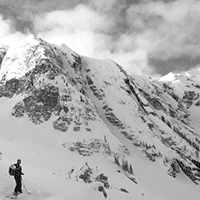Glacier Park Avalanche Victim
WEST GLACIER – A 37-year-old snowboarder was killed in an avalanche this week, while riding solo in Glacier National Park's backcountry.
Brian Curtis Wright lived part-time in Whitefish, where he worked summers at a local restaurant, but he also lived part of the year in East Glacier.
According to park spokesman Wade Meuhlhof, Wright's friends last heard from him on Tuesday evening at about 6 p.m.
"He sent a text message to some friends," Muehlhof said, telling them where he was boarding and how good the spring snow was.
"Our understanding is that he was an avid outdoorsman, and an experienced backcountry snowboarder," Muehlhof said.
Wright's friends tried to reach him by text message on Wednesday, but received no response. They tried again Thursday morning, and then set off to search the area around Mount Shields, in the park's southeastern corner.
They found Wright's Jeep at the trailhead, not far from U.S. Highway 2, Muehlhof said, and one friend skied in to search.
Wright was found on top of the snow, near the end of an avalanche run, on the mountain's northeastern side.
"He managed to stay pretty much on top of the slide," Muehlhof said, but had been badly battered during the tumble.
Rangers received word of the tragedy at about 2 p.m. Thursday, and arrived on the scene to confirm Wright's death by about 5:45 p.m.
Park rangers suspect Wright triggered the slab slide himself, sometime around 1 p.m. Wednesday after talking to his mother via cell phone from the 7,131-foot summit.
Tracks suggest he made two trips to the top, where a two-foot-deep fracture was found just below the mountain's high point. The avalanche ran some 3,000 feet, and measured about 150 yards wide, narrowing into a rocky gully as it ran.
Wright was found about 250 yards above the slide's toe, high in the gully atop an estimated 25 feet of avalanche debris. Rangers believe he tumbled at least 2,000 feet before coming to rest at an elevation of 5,427 feet.
Friends said that although he was traveling solo, Wright did carry an avalanche transceiver. Neither his backpack nor his transceiver has been located.
Muehlhof noted the area did receive "considerable precipitation" on Wednesday, which might have destabilized the spring snowpack.
Investigation into the accident continues.








